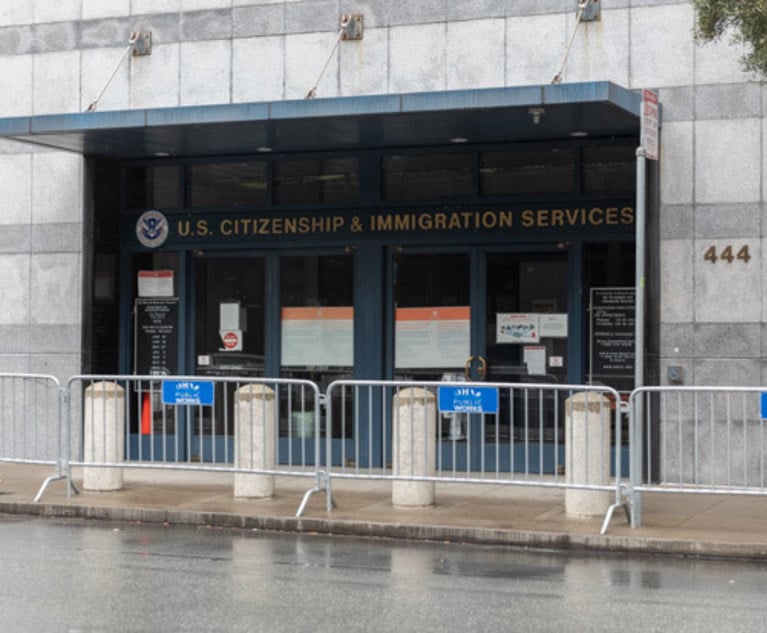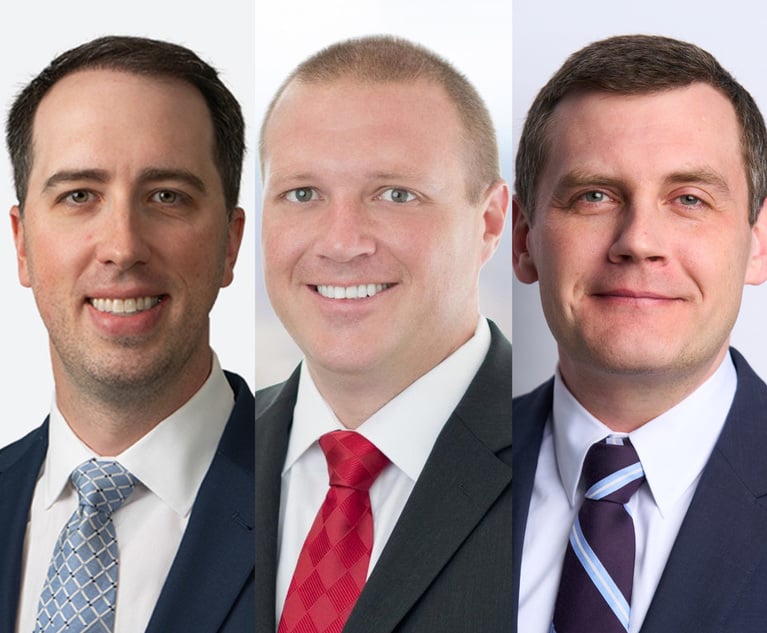 Shari Klevens (left) and Alanna Clair, Dentons. (Courtesy photo)
Shari Klevens (left) and Alanna Clair, Dentons. (Courtesy photo)Here's How to Avoid Santa's 'Naughty' List in 2020
Santa knows when you've been professional and when you haven't.
December 30, 2019 at 11:13 AM
6 minute read
How'd Santa Claus treat you this year? Did you get a new car, a big bonus or or a granted motion for summary judgment? Or did you find only some new pens, a stack of legal pads and a proverbial lump of coal in your stocking?
Next year when Santa makes his list and checks it twice, consider these behaviors so you end up on the right one.
Naughty: Not Being Professional
The practice of law can be adversarial in nature. Lawyers can disagree with each other and, at times, take very different positions. However, as jurisdictions nationwide are renewing their emphasis on lawyer civility, it is important for lawyers to understand that there is a fine line between simply advocating for your client and, on the other hand, becoming consumed in the adversarial nature of the work. A shortcut to being on the "Naughty" list is treating opposing parties or counsel without the civility required by the profession.
In order to be admitted to practice law in most jurisdictions, lawyers typically take an oath of admission that contains pledges to conduct oneself with civility. In Georgia, an admitted attorney swears that he or she "will truly and honestly, justly and uprightly conduct myself as a member of this learned profession and in accordance with the Georgia Rules of Professional Conduct, as an attorney and counselor." Georgia also has adopted the Lawyer's Creed, which provides that lawyers will offer fairness, integrity and civility to opposing parties and their counsel and will strive to make any dispute a dignified one.
Examples of lawyers behaving badly routinely make the legal news. Some read about the lawyer in Florida who was suspended from the practice of law for two years for, among other things, repeatedly disparaging opposing counsel on numerous occasions both verbally and in writing. That lawyer criticized his opposing counsel's motions as "laughable and scurrilous," before renewing a pledge to continue aggressive behavior: "I look forward to litigating the issues you highlight and recovering the fees I bill my client from you PERSONALLY. I think I have never litigated with an attorney who is as disingenuous as you. This really is fun, and so from that standpoint, I thank you."
Another lawyer in California is facing serious repercussions after sending emails to opposing counsel that used harsh language, provocative insults, and threats, including: "Haha. F*** you crooks. Eat a bowl of d***s."
Attorneys who do not act in compliance with this oath—by engaging in name-calling, threats or other needlessly aggressive behavior—may find themselves not only with a lump of coal but also with a critique from a judge or the bar.
Nice: Maintaining Confidentiality
The confidentiality inherent in the attorney-client relationship contributes to the overall trust between lawyers and clients. Although many lawyers have familiarity with the protections of the attorney-client privilege, Rule 1.6, confidentiality is typically broader than the privilege. Rule 1.6 of the Georgia Rules of Professional Conduct calls on lawyers to maintain in confidence all information gained in the professional relationship with a client, even after the client-lawyer relationship has terminated, unless the client gives informed consent or the disclosure is impliedly authorized.
There have been disciplinary cases around the country where lawyers have gotten in trouble for disclosing too much information online, whether in online review websites, blogs, Facebook posts or other electronic communications. As ABA Formal Opinion 480 notes, a lawyer may violate Rule 1.6 (a) "when a lawyer participates in public commentary that includes client information, if the lawyer has not secured the client's informed consent or the disclosure is not otherwise impliedly authorized to carry out the representation."
Notably, there is a broad range of conduct that may still be permissible under Rule 1.6's protection of an attorney's conduct that is "impliedly authorized." Further, attorneys may be permitted to disclose information like client identities—which information is typically confidential—when those attorneys are lateraling to another firm and need to run conflicts.
Being aware of the obligation of confidentiality—and considering the parameters of the rules—can help attorneys stay on the "Nice" list.
Naughty: Not Treating Client Funds Properly
Rule 1.15(I) of the Georgia Rules of Professional Conduct requires lawyers to hold funds and other client property that the lawyer possesses in connection with a representation separate from the lawyer's own funds or other property. The rules have specific guidelines regarding the keeping of funds, management of accounts, safeguarding of property and record-keeping obligations.
The Rules are strict in this regard. The misuse of trust funds may result in an ethics charge against the lawyer with discipline as severe as disbarment. One Georgia lawyer was disbarred and indicted by a federal grand jury for allegedly stealing client money that should have been held in escrow and then lying about the theft to the clients and during depositions. Another Georgia lawyer was disbarred and pleaded guilty to converting client funds for his own use and commingling client funds with his personal funds.
Because the rules can be complicated, but the risks great, many attorneys will take steps to avoid violating the requirements of this rule or to take steps to minimize the risk of accidental violation.
Nice: Mentoring Others and Supporting Team Members
Under Rule 5.1, a law firm partner or managerial lawyer has an ethical duty to supervise junior lawyers. Beyond this ethical obligation to help ensure that junior lawyers are meeting the ethical standards of the profession, supervising lawyers also can help the next generation of practitioners by creating a supportive relationship through mentoring.
Mentorships between senior and more junior attorneys are often advantageous to both the mentor and mentee. Mentoring can promote long-term loyalty, job satisfaction and retention or development of professional skill in a mentee. Mentoring also can lead to better client services and the expansion of opportunities for those typically underrepresented in the legal profession.
We hope you are enjoying your holidays and that you make the "Nice" list in 2020!
Shari L. Klevens is a partner at Dentons in Atlanta and Washington, D.C., and serves on the firm's U.S. board of directors. She represents and advises lawyers and insurers on complex claims and is co-chair of Dentons' global insurance sector team.
Alanna Clair, also a partner at the firm in Washington, focuses on professional liability and insurance defense. Klevens and Clair are co-authors of "The Lawyer's Handbook: Ethics Compliance and Claim Avoidance" and the 2020 edition of "Georgia Legal Malpractice Law."
This article was completed with assistance by Chantel Greene, an associate in the Washington, D.C. office of Dentons.
This content has been archived. It is available through our partners, LexisNexis® and Bloomberg Law.
To view this content, please continue to their sites.
Not a Lexis Subscriber?
Subscribe Now
Not a Bloomberg Law Subscriber?
Subscribe Now
NOT FOR REPRINT
© 2024 ALM Global, LLC, All Rights Reserved. Request academic re-use from www.copyright.com. All other uses, submit a request to [email protected]. For more information visit Asset & Logo Licensing.
You Might Like
View All

Walking a Minute in Your Adversary’s Shoes: Addressing the Issue of 'Naive Realism' at Mediation
5 minute read
Anticipating a New Era of 'Extreme Vetting,' Big Law Immigration Attys Prep for Demand Surge
6 minute read
On The Move: Polsinelli Adds Health Care Litigator in Nashville, Ex-SEC Enforcer Joins BCLP in Atlanta
6 minute readLaw Firms Mentioned
Trending Stories
Who Got The Work
Michael G. Bongiorno, Andrew Scott Dulberg and Elizabeth E. Driscoll from Wilmer Cutler Pickering Hale and Dorr have stepped in to represent Symbotic Inc., an A.I.-enabled technology platform that focuses on increasing supply chain efficiency, and other defendants in a pending shareholder derivative lawsuit. The case, filed Oct. 2 in Massachusetts District Court by the Brown Law Firm on behalf of Stephen Austen, accuses certain officers and directors of misleading investors in regard to Symbotic's potential for margin growth by failing to disclose that the company was not equipped to timely deploy its systems or manage expenses through project delays. The case, assigned to U.S. District Judge Nathaniel M. Gorton, is 1:24-cv-12522, Austen v. Cohen et al.
Who Got The Work
Edmund Polubinski and Marie Killmond of Davis Polk & Wardwell have entered appearances for data platform software development company MongoDB and other defendants in a pending shareholder derivative lawsuit. The action, filed Oct. 7 in New York Southern District Court by the Brown Law Firm, accuses the company's directors and/or officers of falsely expressing confidence in the company’s restructuring of its sales incentive plan and downplaying the severity of decreases in its upfront commitments. The case is 1:24-cv-07594, Roy v. Ittycheria et al.
Who Got The Work
Amy O. Bruchs and Kurt F. Ellison of Michael Best & Friedrich have entered appearances for Epic Systems Corp. in a pending employment discrimination lawsuit. The suit was filed Sept. 7 in Wisconsin Western District Court by Levine Eisberner LLC and Siri & Glimstad on behalf of a project manager who claims that he was wrongfully terminated after applying for a religious exemption to the defendant's COVID-19 vaccine mandate. The case, assigned to U.S. Magistrate Judge Anita Marie Boor, is 3:24-cv-00630, Secker, Nathan v. Epic Systems Corporation.
Who Got The Work
David X. Sullivan, Thomas J. Finn and Gregory A. Hall from McCarter & English have entered appearances for Sunrun Installation Services in a pending civil rights lawsuit. The complaint was filed Sept. 4 in Connecticut District Court by attorney Robert M. Berke on behalf of former employee George Edward Steins, who was arrested and charged with employing an unregistered home improvement salesperson. The complaint alleges that had Sunrun informed the Connecticut Department of Consumer Protection that the plaintiff's employment had ended in 2017 and that he no longer held Sunrun's home improvement contractor license, he would not have been hit with charges, which were dismissed in May 2024. The case, assigned to U.S. District Judge Jeffrey A. Meyer, is 3:24-cv-01423, Steins v. Sunrun, Inc. et al.
Who Got The Work
Greenberg Traurig shareholder Joshua L. Raskin has entered an appearance for boohoo.com UK Ltd. in a pending patent infringement lawsuit. The suit, filed Sept. 3 in Texas Eastern District Court by Rozier Hardt McDonough on behalf of Alto Dynamics, asserts five patents related to an online shopping platform. The case, assigned to U.S. District Judge Rodney Gilstrap, is 2:24-cv-00719, Alto Dynamics, LLC v. boohoo.com UK Limited.
Featured Firms
Law Offices of Gary Martin Hays & Associates, P.C.
(470) 294-1674
Law Offices of Mark E. Salomone
(857) 444-6468
Smith & Hassler
(713) 739-1250






